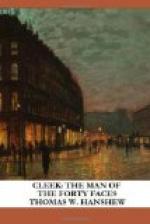“I remember the pair very well indeed,” said Cleek. “They toured the Music Halls for years, and I saw their performance frequently. They were among the first, I believe, to produce that afterwards universal illusion known as ‘The Vanishing Lady.’ As I have not heard anything of them nor seen their names billed for a couple of years past, I fancy they have either retired from the profession or gone to some other part of the world. The man was not only a very clever magician, but a master of mimicry. I always believed, however, that in spite of his name he was of English birth. The woman’s face I never saw, of course, as she was always veiled to the eyes after the manner of Turkish ladies. But although a good many persons suspected that her birthplace was no nearer Bagdad than Peckham, I somehow felt that she was, after all, a genuine, native-born Turk.”
“You are quite right in both suspicions, Mr. Cleek,” put in the Major agitatedly. “The man was an Englishman; the lady is a Turk.”
“May I ask, Major, why you speak of the lady in the present tense and of the man in the past? Is he dead?”
“I hope so,” responded the Major fervently. “God knows I do, Mr. Cleek. My every hope in life depends upon that.”
“May I ask why?”
“I am desirous of marrying his widow!”
“My dear Major, you cannot possibly be serious! A woman of that class?”
“Pardon me, sir, but you have, for all your cleverness, fallen a victim to the prevailing error. The lady is in every way my social equal—in her own country my superior. She is a caliph’s daughter. The title which the playgoing public imagined was of the usual bombastic, just-on-the-programme sort, is hers by right. Her late father, Caliph Al Hamid Sulaiman, was one of the richest and most powerful Mohammedans in existence. He died five months ago, leaving an immense fortune to be conveyed to England to his exiled but forgiven child.”
“Ah, I see. Then, naturally, of course—”
“The suggestion is unworthy of you, Sir Henry, and anything but complimentary to me. The inheritance of this money has had nothing whatever to do with my feelings for the lady. That began two years ago, when, by accident, I was permitted to look upon her face for the first, last, and only time. I should still wish to marry her if she were an absolute pauper. I know what you are saying to yourself, sir: ’There is no fool like an old fool.’ Well, perhaps there isn’t. But—” he turned to Cleek—“I may as well begin at the beginning and confess that even if I did not desire to marry the lady I should still have a deep interest in her husband’s death, Mr. Cleek. He is—or was, if dead—the only son of my cousin, the Earl of Wynraven, who is now over ninety years of age. I am in the direct line, and if this Lord Norman Ulchester, whom you and the public know only as ‘Zyco the Magician,’ were in his grave there would only be that one feeble old man between me and the title.”




